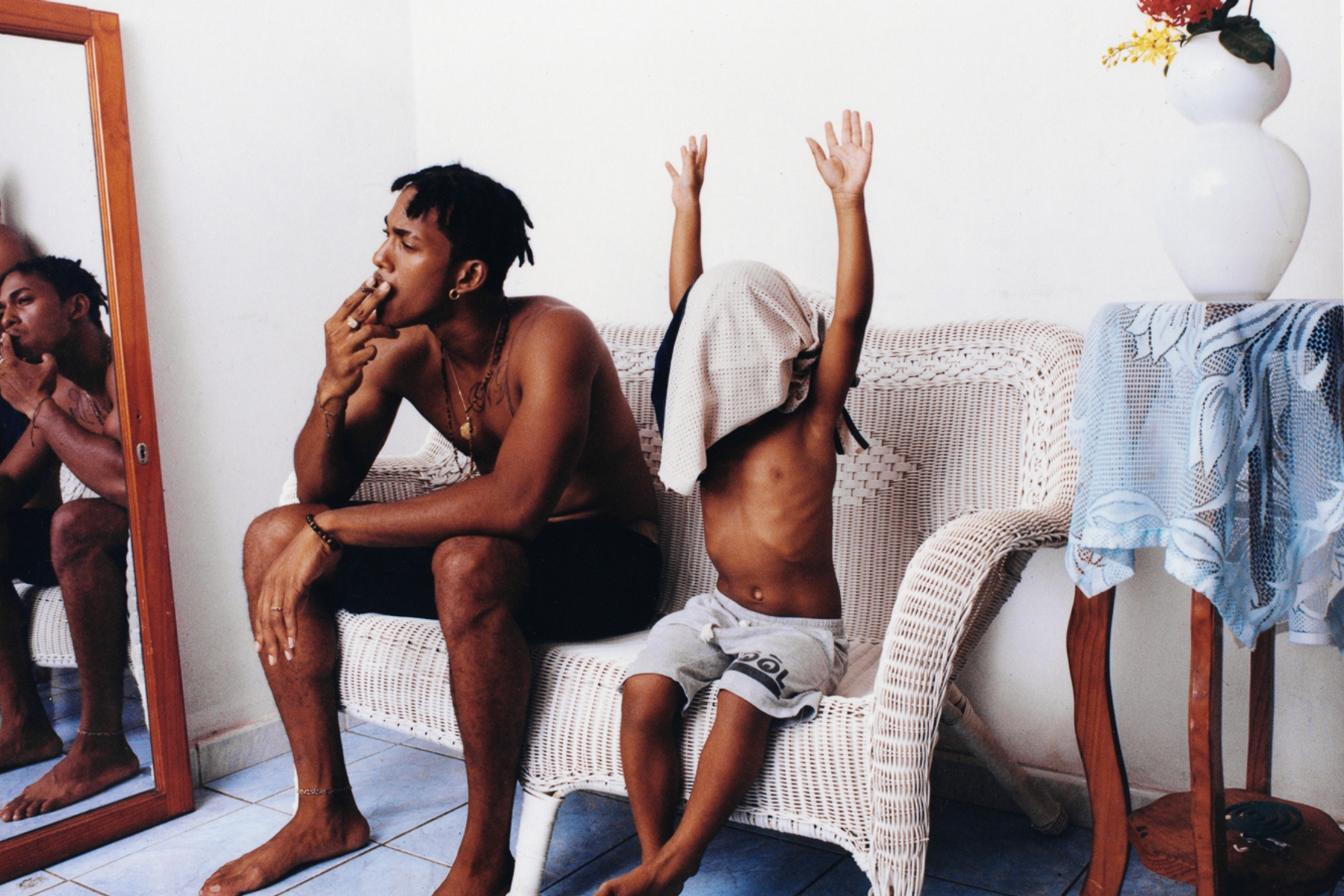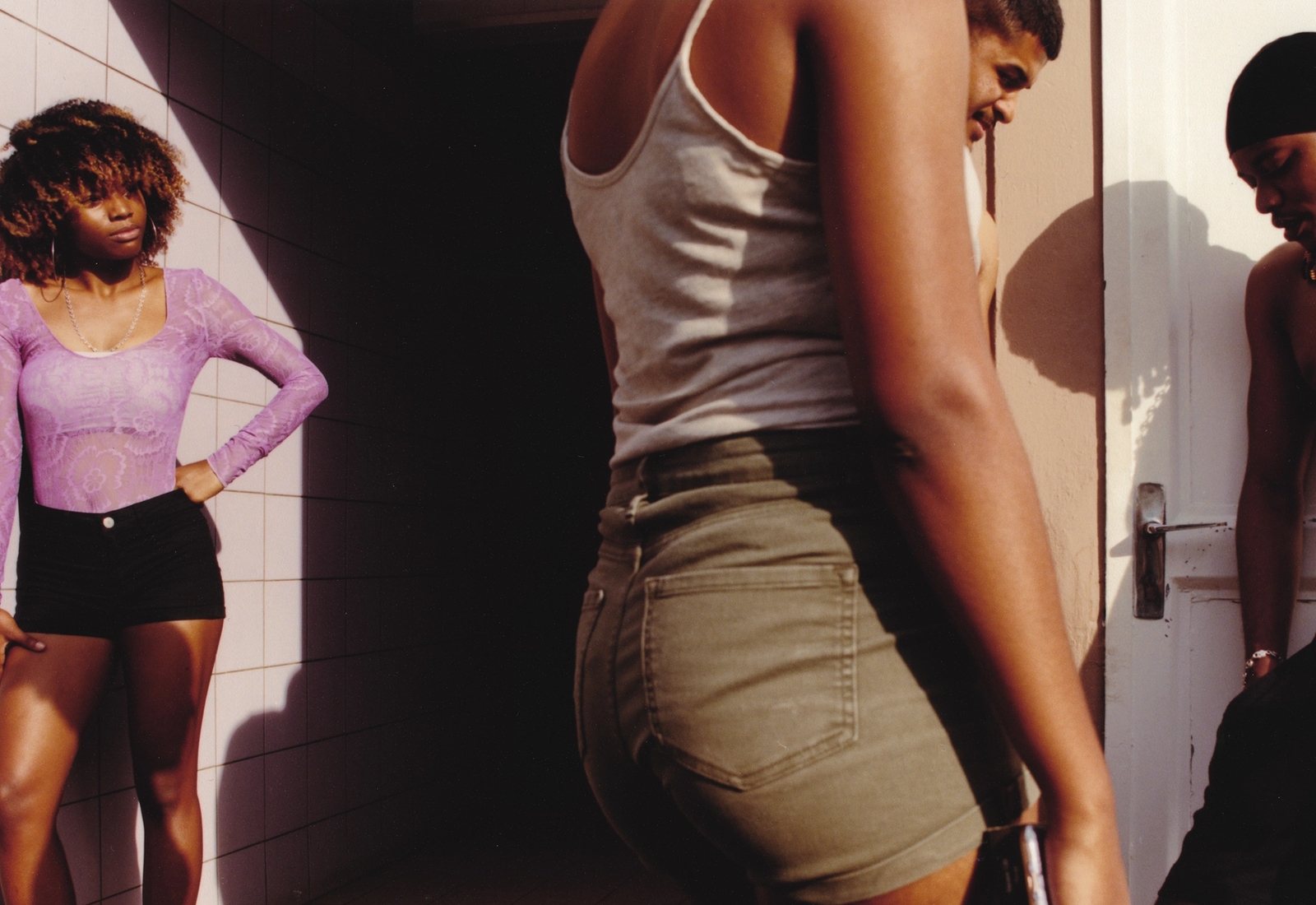Finding Grace in La Kaz by Fabien Vilrus & Nicolas Guichard
PHOTOGRAPHY Fabien Vilruz
FASHION DESIGNER Nicolas Guichard
INTERVIEW Svétäl Chassol
CURATOR Juan Corrales
Photographer Fabien Vilrus and designer Nicolas Guichard return to Réunion, an island located a couple hundred miles east of Madagascar. There, Vilrus and Guichard documented the obscure, vanishing subcultures on the island. This absence is explained in a letter that accompanies the exhibition, written by political scientist Françoise Vergès. In the letter, titled "La Kaz, a threatened Reunionese habitat," Vergès traces the historical and material conditions of the island,—which represent "coloniality in the 21st century"—while also pointing out the potential for a "new sociality/sociability" that can be felt, touched, and seen through local architecture.


Both of you were born on the island of Reunion, how and when did you meet?
We met randomly in Paris four years ago at a dinner with common friends from New York. That moment was quite funny because we spoke to each other in English before we found out we were both born in Reunion. We never expected to meet someone else from the island in our circles of acquaintances.
With this exhibition, as a Martinican, I realized how La Kaz is such a Creole concept, if we can call it that. Or at least, part of Creole culture. I see myself in this exhibition even though I’m from another colonized island far away from yours. Did you know this before doing it?
We were really focused on our own Creole culture there. We realized how many people from other islands such as Guadeloupe or Martinique were also attracted and touched by the same topics and concepts during the exhibition.
Since then, we've opened interesting dialogues; realizing that we, collectively, had shared views and experiences. It really pushed us to explore the Creole culture beyond Reunion.


How does La Kaz reflect your perspective of the culture on Reunion?
The whole project was about saving the part of our culture and memories that we were losing in Reunion. It was like the more often we visited, the less Reunionese culture there was. This change operated on many levels: we couldn’t focus on everything for the exhibition so we chose la Kaz as it was represents “home” disappearing physically and conceptually as well.
Fabien, could you tell us more about your interest about beliefs and superstitions amongst your island community? Isn’t it quite taboo? Was it hard for you to chime in on this ? Why do you feel it was necessary?
Growing up, I had a strict religious education. And there are so many superstitions and stories that make the atmosphere really different on the island that I felt the need to explore it through my work. There’s a big part of it linked to rituals and evil and this was extremely difficult to approach.
Everybody on the island would tell you to always stay away from it including my family and they would all have witnessed something in their lives that would have discouraged you from being curious about it. But besides this, my main interest goes really to the people. Those who truly believe in it and how this subject would impact their lives. But I’m still at the beginning—it's quite a slow process.


Nicolas, I saw that Dancehall party culture has been part of your work, and it made me so happy.
I believe Dancehall has influenced fashion a lot, yet it was never really named, nor celebrated officially by big houses or institutions. Not that we crave that recognition, but we do feel snubbed sometimes. I believe it is inherent to our Creole cultures—and to France—but it's not yet recognized as much as it should be. What was the process for you to decide to honor it in this way?
I’ve always been attracted to the Dancehall culture. Growing up in Reunion, I spent a lot of time listening to Ragga/Dancehall music and remember being mesmerized by how women dressed in videoclips, and also by the lyrics. Dancehall is all about fashion.
I got obsessed with these brave women fighting for their place in a male dominated industry.
When I first started to process Pool Party Stone Love, I looked into a lot of archives of ragga/ dancehall music videos from the Caribbean and Reunion, but also through old pictures of parties from the 80’s to early 2000’s and started to translate its energy and exuberance into my work. I wanted my clothes to be part of a celebration of this influential subculture movement.



Also, I feel like works like yours help deconstruct Dancehall culture as a whole, which stays quite conservatory. It is shown in a place where some people would not expect. Is that something that you want?
I believe people in France are not really aware of the richness of dancehall culture which is usually associated with vulgarity. There are different ways to look sexy that's not explicitly "vulgar."
I’m using dancehall references into my work as a base. However, I never stick to that. I always merge various experiences I felt living in Reunion and other references I find during my research process which I think temperate my design vision. The whole idea is to showcase my clothes through a Creole vision in a place where the Creole culture is not really advertised nor respected.



I feel like all of us who were born on French territory overseas but had to move to France later on, are constantly feeling a certain nostalgia that fills our lives and creative process. Do you feel like nostalgia, in any form, is essential to your work?
You’re right, there is a certain nostalgia in our work. When we came here, the contrast was so strong compared to our past lives on the island, that we thought that it was necessary to create a bridge through our work. We think that working like this provides us a certain balance and keeps us connected with where we come from and where we are going. This nostalgia is in fact quite linked to our identity, it’s what’s bringing us back to home when we’re far from it.


Do you struggle with the diasporic experience of wanting to pursue a certain career in France (Paris) while feeling like you need to stay longer on your island to work there, and develop things there yourself? Do you think it is possible?
We were actually discussing this topic recently. A few years ago it was inconceivable for us to pursue a career in the art field on the island. Our goal was to discover northern countries and escape the island, like most young locals do nowadays after high school.
It’s only after questioning our approach to art and studying our past that we were able to get this new point of view. Now, it seems entirely possible and, at this point in our career, it's necessary.
According to you, what does the Reunionese youth need right now? Your work sheds light on an environment that seems to have been abandoned by the government, even by some Reunion natives and locals. What else do you think we need to share more light on the youth over there? What resources would be needed?
The list is long. In our view, it’s more of a global issue; it's closely linked to our colonial past on the island with all that is involved with.
Actually, the Reunionese youth need to be more aware of the fragility of our culture on the island.
We realized the youth have less interest in the local culture nowadays compared to the past generations. They are more distracted by Western way of life which was brought mainly by France and is advertised in the media as a "social success."
We’ve done it here through art but there’s a strong urge to revalue the local culture on every level of the society.

Do you believe modernity and tradition can co-exist? It seems like modernity is erasing tradition, especially on our islands, but I’ve seen other places where modernity can live perfectly with tradition. How do we build that new sociability that you seem to be talking about here with this exhibition?
Yes, definitely! We were arguing on this topic with some of our friends during our trip there. One of them was asking us why we were obsessed with advertising old “Kaz”.
She thought that, with our exhibition, we wanted to encourage locals to keep living in these shabby habitats. Her point was that the locals were living a better life nowadays thanks to modernity, globalization and the French influence and that it was unnecessary to move backwards.
Of course, "moving backwards" wasn't our goal. We sought to create a clear connection between the past and present, using our local heritage and Reunionese people as the base to build a new society. The biggest mistake our people made is that we evolved by totally forgetting our own culture. That is the problem.
How would Parisians react if Haussmannian habitat would be demolished in order to replace it by modern and insipid new buildings? It’s the same feeling for us with the new architectural landscape of Reunion Island.


You have a piece written by Françoise Vergès that introduces the exhibition. How was that for you? Did she influence you? If so, would you mind telling me how?
This project was initially built on pure emotion and feelings that we both shared. We went back home and generated these images spontaneously.
When we got back in Paris, we had our point of view on the topic but we didn’t feel legitimate to have an exact anthropological and historical outlook.
That’s why we wanted to have a discussion with her to make sure we were on the right path.
We were honored and pleased to have her write for us. She surely enlightened some blind spots and answered many questions that we didn’t know how to answer.

Read also "DOCUMENTATIONS Arts" & "Décoloniser les arts"
Finally, how do you manage to find a bit of La Kaz when you’re not in Reunion? Is it possible?
Yes, we think so. Through community and the friends we have here. All these shared moments—enjoying Creole food, listening to music or even talking in Creole are all ways to find a bit of La Kaz here in Paris. We also try to make it happen through our work and our relationships with other people.



